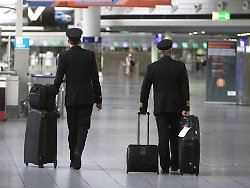Monday, March 1st, 2021
Professional crisis due to Corona
Not all pilots return to the cockpit
Thousands of pilots fear for their jobs in the Corona crisis. Instead of top salaries, they are threatened with unemployment. Since a classic field of activity is currently closed to ex-pilots, many have to look around in new fields of activity.
"My landlord or my bank doesn't care if I'm a pilot." After 16 years of work, the pilot of the insolvent airline Walter has almost his back to the wall. With the Corona crisis, thousands of captains and co-pilots are suddenly faced with existential questions in the former long-term growth market of air traffic. The European pilots' association EPA estimates that of the 65,000 or so workers on the continent, around 18,000 are permanently losing their jobs. At the German Lufthansa alone, up to 1200 of around 5500 colleagues will go in the coming year, estimates the Cockpit Association. Instead of top salaries, some face unemployment.
The airlines' cockpit teams are quite heterogeneous: There are full academics who also have other positions, pilots in management, but also colleagues who, after completing their two-year training, assumed that pilots were a job. Especially with this group, good advice is expensive, says Holger Bausch, the aviation expert at the employment agency at Frankfurt Airport. "Most of them first worry about maintaining their license and see what is possible worldwide. But a job change to China, the Gulf States or South America is currently almost impossible because of the pandemic."
Not everyone will find a place to stay again
Erhard Walther, head and founder of the Hamburg-based consulting company Interpersonal, does not believe that all there again. "I'm afraid that some pilots will burn up. It is very time-consuming to maintain a license and medical requirements. It may not even pay off for older colleagues. Younger ones, who may also have to look after a family, will switch to other professions." The operator of the career.aero job exchange for aviation specialists also sees a classic field of activity currently blocked for ex-pilots: "The airports and suppliers themselves have teams that are too large on board at the moment."
Lufthansa pilot Leila Belaasri points out problems with the ATPL commercial pilot license, which is not a recognized professional qualification in Germany. "This classification does not reflect the multifaceted competence profile of a pilot. As a result, it is significantly important to win the support of the Federal Aviation Office in order to create the legal conditions for better recognition. So that colleagues can more easily get into other professions or not entirely in related courses have to start from scratch. "
After eleven years of piloting, Wolfgang Zschauer had to return to the ground for health reasons and has since gained a wide range of professional experience. He says: "Pilots have a very broad range of technical systems expertise in many different specialist areas. They are 'qualified as an engineer' and can familiarize themselves with complex systems extremely quickly." In addition, pilots are used to working properly according to specified standards, even if precision and exact documentation are required for the umpteenth repetition. "These are skills that are particularly in demand in test laboratories or during audits. Many branches of industry such as pharmaceuticals, chemicals, automobiles and mechanical engineering have a need."
Opportunities outside of aviation too
In his current job, Zschauer makes sure that the complex rules of the European aviation security authority EASA are implemented and complied with at Munich Airport. A classic task for ex-pilots, he thinks. "We know the importance of accuracy and can analyze incidents in detail." Employment agency Bausch advises those affected to self-analyze: "The applicants have to look in each individual case to see which areas of their previous job they want to expand. That could be, for example, aviation law, technology or meteorology."
Interpersonal boss Walther also sees opportunities outside of aviation: "In principle, pilots with their skills can also be deployed well in high-risk technical environments, for example in power plants. Too few potential employers have recognized this so far." The pilot and coach Belaasri advertises the leadership qualities of the professional group: "Pilots are responsible and decision-makers who can use all available resources in a given team with lived psychological security. This requires high communication skills to create an atmosphere of openness and trust create. Pilots have a strong ability to solve problems and conflicts. " It remains to be seen whether this also applies to one's own problems. "
.
